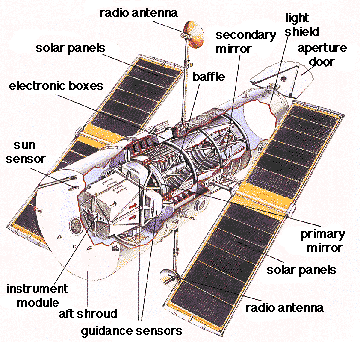[AlreadyBeenThere | NextStop]
Background |
 |
This section includes the description, history, and purpose of the Hubble
Space Telescope; and some background on the planets we considered during
this project

Description of the Hubble
Deployed on April 25, 1990, the Hubble Telescope is a giant observatory
aboard a spacecraft. It can make observations of the universe using visible,
near-ultraviolet and near-infrared light spectra above the filtering effect
of earth's atmosphere. Because of its ability to capture faint light in fine
detail and the precision of its observations the Hubble Space Telescope is
rapidly expanding astronomers understanding of the cosmos.
The History of the Hubble Telescope
How the Hubble Came to Be
Long before mankind had the ability to go into space,
astronomers dreamed of placing a telescope above Earth's obscuring atmosphere.
An observatory in space was proposed in 1923 by the German scientist Hermann
Oberth, whose work inspired rocket pioneer Dr. Wernher von Braun's interest
in space travel. Scientific instruments installed on early rockets, balloons,
and satellites in the late 1940s through the early 1960s produced enough
exciting scientific revelations to hint at how much remained to be discovered

Science Objectives
The Hubble Telescope was designed to:
- Investigate celestial bodies by studying their composition, physical
characteristics, and dynamics.
- Observe the formation of stars and galaxies, and study their formation
and evolution.
- Study the history and evolution of the universe.
- Provide a long-term space-based research facility for optical astronomy.

History of the Telescope
About Edwin Hubble
About the Planets
Planets to be Observed
The Live from the Hubble Space Telescope observations are
targeted for March 1996 when 4 planets - Jupiter, Uranus, Neptune and
Pluto - will be in a position for observation by the telescope. The
planets Neptune and Pluto were selected (via the Great Planet Debate) as
targets for observations by students.
- Neptune: 2 orbits
- Pluto: 1 orbit
- Jupiter: 1 orbit courtesy of Planet Advocate Reta Beebe
- Uranus: Considered but not selected
|

 |
Example of Planet Information Essays:
About Neptune
by Heidi Hammel
What's interesting about my planet? What I like best about
the planet Neptune is that every time you look at it, it's different, so
Neptune can be >your< planet. The pictures that would be taken of Neptune
would be yours. No one else would have seen the clouds that you see and they'll
never be seen again probably. And so that means that the pictures of Neptune
you take would be absolutely unique

[AlreadyBeenThere
| GoToRealPage
| NextStop]
GoBackToStart
This page was created by
Tobin Snell and
Josh Parker, seniors at Palo
Alto High School in California.











![]()